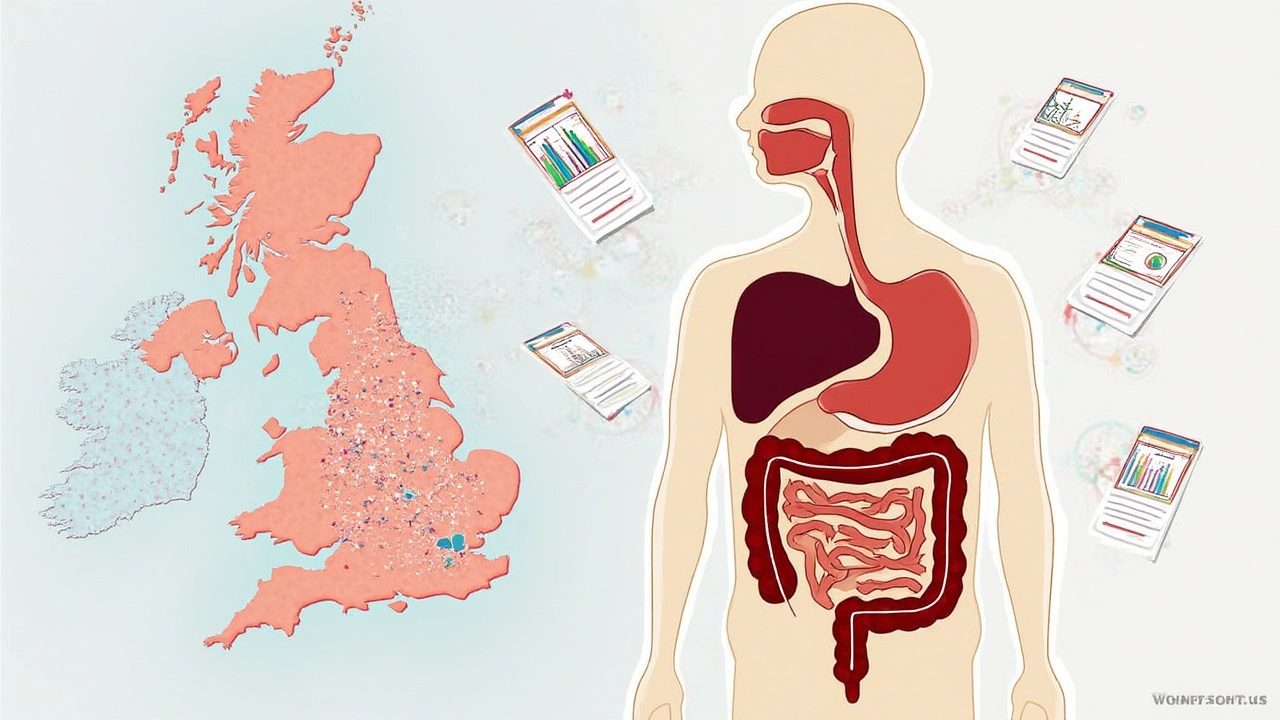Would you believe if I told you that some people have up to a thousand little growths, called polyps, inside their colon and might not know it until something much bigger comes crashing down? I used to think of polyps as those harmless bumps on the radar during a colonoscopy, only for older folks. Then I learned how, in some families, these polyps breed like rabbits—you chop one out, and another one pops up, leading not just to cancer risk but to a chain reaction with other stomach problems. That’s where polyposis isn’t just a lonely villain, but part of a whole network of gastrointestinal hassles. When my daughter Saffron started having trouble with stomach pains, I could never have guessed that polyps might be at the root. Gastroenterologists now say that polyposis is way more than a random accident; it’s a signal flare that something’s out of balance in your gut and, sometimes, your genes.
How Polyposis Develops: Genetics, Environment, and Triggers You Can't Ignore
Polyposis mostly shows up as clusters of polyps in the colon or rectum, but it isn’t always a solo act. About 1 in every 8,000 people gets it through inherited genes, which sounds tiny, until you realize the ripple effect in families. The most common inherited forms—Familial Adenomatous Polyposis (FAP) and Peutz-Jeghers syndrome—tend to start in your teens or twenties, so don’t be fooled by the myth that this is a senior citizen’s disease.
Doctors have pinned most cases of polyposis on specific gene mutations. If the APC gene is mutated, as in classic FAP, your colon can start growing hundreds to thousands of polyps before you hit 40. For Peutz-Jeghers syndrome, STK11 gene changes mean polyps all through the digestive tract and some wild freckling of the skin. But polyposis isn’t all about birthright or unlucky genes—you’ll see acquired forms too, often tied to inflammation, diet, or chronic gut conditions. If you wrestle with Crohn’s disease or ulcerative colitis, studies from the American Gastroenterological Association show you’re more likely to develop certain polyps, even without family history.
When it comes to risk, the numbers are sobering. About 70%-80% of individuals with FAP will develop colorectal cancer by age 40 if untreated, so catching those polyps early isn’t optional. But here’s what’s weird: not every single polyp turns into cancer or even causes symptoms. Many people skate by with no idea, while others (like Saffron’s friend at school) get anemia or intense bowel changes first. Recent research in The Lancet showed that polyposis syndromes can trigger everything from vitamin deficiencies (because polyps mess with absorption) to full-blown blockages. So if you’ve ever ignored odd gut symptoms, thinking it’s just a bug or stress, you might want to pay closer attention.
Let’s talk triggers. Eating lots of processed red meats, especially those low-fiber, high-fat diets, are well-documented troublemakers for polyps. Add smoking and heavy drinking, and the risk multiplies. But the twist? Polyposis can team up with genetics and turn a minor trigger into something huge. Even lifestyle changes sometimes just aren’t enough if your DNA has wired you differently. Gut health, from childhood, starts to play a surprisingly central role—the earlier you tackle healthy eating and activity, the better shield your gut has against polyposis and its knock-on effects.
| Polyposis Type | Related Gene(s) | Risk of Colorectal Cancer (by Age 40) | Average Age of Onset |
|---|---|---|---|
| FAP | APC | ~80% | Teen years to early 20s |
| Peutz-Jeghers | STK11 | 39%-55% | Teens/early adulthood |
| Serrated Polyposis | Unknown | Varies, up to 50% | Usually after 50 |
Bottom line: If you’ve got digestive issues, strong family history, or are heading toward middle age, check up. Most inherited polyposis cases are best caught by genetic screening, while acquired ones might pop up as a sneak attack—so watch your symptoms and never skip a scan your doctor recommends.

Polyposis Isn’t Alone: How It Tangles with Other Gastrointestinal Disorders
It’s easy to look at polyposis as a standalone problem: you find polyps and snip them out, and that’s that, right? Not really. Polyposis actually weaves itself into plenty of other gut conditions—something that both frustrates and shocks doctors and families alike. For example, FAP often brings with it not just colon polyps, but polyps in the stomach (fundic gland polyps, anyone?), the duodenum, and even the small bowel. That means endoscopies, not just colonoscopies, become part of life for folks with these syndromes.
Ever wondered why some people with polyps start having symptoms that mirror irritable bowel syndrome (IBS)? Turns out, chronic inflammation from repeated attacks on the gut wall—either from polyps rubbing against tissue or from tiny microbleeds—can set off tummy cramps, unpredictable stool patterns, and lasting discomfort. It’s not just IBS, either. What about those sudden outbreaks of gastritis or even stomach ulcers in polyposis patients? Polyps in the upper gut make the acid balance a mess, leading to symptoms you’d never expect. A study published in Gut in 2023 tracked 126 patients with inherited polyposis, and almost half had at least one major stomach or small bowel disorder by age 25—not a stat to ignore.
Crohn’s disease and ulcerative colitis are another part of this web. Here’s the twist: chronic inflammation from these conditions seems to boost the odds of polyps, especially when flare-ups get out of control. And the reverse can be true too—polyps sometimes block the bowel, trap bacteria, or just irritate things enough to trigger or complicate chronic inflammatory bowel disease. When Indigo was little, his best friend was often out of school with “stomach issues,” but after enough scopes, the doctors found both polyps and inflammation packed into his gut. The doctors called it a “mixed presentation,” which is just medical speak for “we really don’t know what set off what.”
But let’s get even scarier—some types of polyposis bring higher risks for cancers outside the gut, especially in Peutz-Jeghers syndrome. Breast, ovarian, pancreatic, and even testicular cancers have all shown up at higher rates in these families thanks to the gene ties. So thinking that polyps only mess with your colon is a dangerous blind spot. And if you deal with ongoing gut infections, food intolerances, or celiac disease? Chronic irritation is like fertilizer for polyps. Studies from the Cleveland Clinic say chronic inflammation in the gut environment speeds up the formation and growth of abnormal polyp tissue.
There’s also a wild feedback loop nobody likes talking about: anxiety and gut disorders. Constant gut pain or the worry about “what if this polyp is the wrong kind” can supercharge stress hormones that, in turn, play havoc with gut motility and immune function. Complicated? You bet. But when you watch someone you love cycle through scans, colon preps, and surgeries, you realize the mind-gut connection is just as powerful as anything in your DNA.
“Polyposis syndromes highlight how deeply interconnected the body’s systems can be—the gut is not just a pipeline, but the heart of health.” — Dr. Robert Meyer, Mayo Clinic gastroenterologist
Practical tip? If you have polyposis or a related syndrome, don’t ignore symptoms that seem to drift away from the colon—like chronic stomach pain, trouble swallowing, or even recurring mouth ulcers. Keep a diary, because the pattern matters, and let your doctor know every detail. And if your gut comes with an alphabet soup of diagnoses (FAP, IBD, IBS, GERD), consider seeing a gastrointestinal genetics specialist, not just your average doc. They know how these pieces fit together—you shouldn’t have to puzzle it out alone.

Lifestyle, Early Testing, and Building a Gut-Healthy Life When Polyposis Looms
Knowing your risk is only part of the picture. You want to turn knowledge into action, especially when there’s a family history or strange, stubborn symptoms. Here’s where lifestyle and early screening become your best tools. The gold standard for detection is still the colonoscopy—but if you’re high-risk, specialists might want to start annual checks as young as 10 or 12 years old. For inherited syndromes, yearly upper endoscopies and sometimes even capsule camera studies are routine, not just optional extras.
Genetic counseling is often the missing piece. If your family has a history of polyposis syndromes or weird digestive cancers, counseling can pave the way for smart choices. It’s not all doom and gloom—actually, early planning can shave off gigantic risks. Kids like Saffron and Indigo, for example, get regular check-ups years before there’s any sign of trouble, just because we decided to chase down the family history hard and fast. One tip that has helped our family: take every weird stomach symptom seriously, and keep records each year for your kids and their first-degree relatives.
But it’s not just about medical tests. Nutrition and lifestyle carry real power. High-fiber diets—plenty of veggies, legumes, fruits, and nuts—aren’t just good for “regularity.” Studies out of the University of Cambridge in 2022 showed that people eating 30 grams of fiber per day saw a 20% decrease in polyp-related complications over five years, especially when paired with lower intake of processed foods. Probiotic-rich foods, like yogurt with live cultures and fermented pickles, feed your good gut bacteria, which may help keep abnormal polyp formation in check. Regular physical activity (think 30 minutes a day, even brisk walking) lowers inflammation and seems to cut polyp growth, too. Ditch the two-pack-a-day habit and cut back on booze—the risk math just isn’t worth it.
Want something actionable? Here’s a list you can stick to your fridge:
- Fiber first: Build every meal around at least one plant-based, high-fiber option.
- Water over soda: Hydration keeps your gut moving and less irritable.
- Track changes: Don’t brush off blood in stool, new belly pain, or weight loss—get those checked out.
- Family records: Keep track of who had polyps, what type, and when—this helps your doctor decide your best screening plan.
- Move daily: Even light exercise lowers polyp risk and helps with gut inflammation.
- Ask about non-invasive screening: Stool-based tests are advancing fast and may catch risks earlier than you’d think.
One extra tip—seek out support groups, either local or online. When Indigo faced his first round of endoscopies, he found more comfort trading jokes with other kids going through the same thing than from any expert lecture. That sense of community helps if you’re dealing with a chronic or inherited gut disorder; you’re far from alone.
To sum up, polyposis isn’t just “a batch of polyps.” It’s a flashing red light that your gut ecosystem—genes, diet, immune quirks—might be tangled up with other disorders. Early detection, a gut-friendly lifestyle, and sharing your story (and family history) could be what keeps things calm instead of crisis. The best advice? Trust your gut, literally and figuratively, and don’t be afraid to ask questions or push for more tests—sometimes your instincts know something before the scans do.


19 Responses
Man, this hit different. My cousin got diagnosed with FAP at 19-no symptoms, just a family history we ignored. Now she’s got a colectomy and yearly upper scopes. It’s wild how one gene can rewrite your whole life. Glad someone’s talking about this.
I’ve been reading up on this since my sister got diagnosed with Peutz-Jeghers last year, and honestly? The way polyposis connects to every other gut issue is terrifying but also kind of beautiful-it’s like your body’s trying to scream in a language we’re only just learning to translate. The fact that polyps can trigger vitamin deficiencies, mimic IBS, and even link to breast cancer? It’s not just about the colon anymore. It’s about the entire ecosystem. I started tracking her diet, sleep, stress levels, even her menstrual cycle-turns out, inflammation doesn’t care if you’re ‘just having a bad week.’ It just shows up. And yeah, fiber helps, probiotics help, but nothing beats catching it early. If you have a family history, don’t wait for symptoms. Get screened. Even if you feel fine. Even if you think it’s ‘not your time.’ Your future self will thank you.
OMG this is so true 😭 I’ve had 3 colonoscopies already and they keep saying ‘it’s just inflammation’ but I KNOW something’s off. I think Big Pharma doesn’t want us to know that polyps are caused by GMOs and fluoridated water. My cousin’s doctor told her to ‘eat more kale’ but she’s still got 14 polyps. I’ve been researching for 2 years now and I’m 100% sure this is all a cover-up. Also, why do they always use the word ‘syndrome’? That’s just code for ‘we don’t know what’s wrong.’ 🤔
Look, I’m not saying this is a conspiracy, but why are all these studies funded by pharmaceutical companies? They make billions off colonoscopies and surgeries. Meanwhile, the real solution? Aloe vera juice, apple cider vinegar, and avoiding all processed foods. I’ve cured my own polyps with just one bottle of Bragg’s and a 30-day juice cleanse. No meds, no surgery. The medical system is broken. They’d rather cut you open than tell you to stop eating white bread.
Everyone’s acting like this is some new discovery. Newsflash: this has been happening for decades. The government hides it because they don’t want you to know how many people are getting cancer from processed meat and vaccines. My uncle died at 34 with 800 polyps. They said ‘genetics’ but he never ate red meat. Coincidence? I think not.
Wow, another one of these feel-good ‘gut health’ blogs. Look, I’ve read the Lancet study. The real issue is that Western medicine is too lazy to diagnose properly. In my country, we don’t wait for polyps-we screen at 25, not 40. And we don’t just hand out fiber advice like it’s a magic pill. We do full genomic panels. You people are treating a nuclear bomb with a Band-Aid.
My uncle in Lagos had this-FAP. He didn’t have a single doctor visit till he couldn’t eat. By then, it was too late. But my cousin? She got screened at 16 because we asked. She’s 24 now, no cancer, no surgeries. It’s not about money. It’s about asking. Talking. Not waiting for pain. We need more of this in Africa. Not just ‘go to hospital’-but ‘go to hospital and ask for genetic testing.’
...I had a polyp once. It was tiny. They took it out. I didn’t think about it again. Until I read this. Now I’m checking my stool. Every day. And I’m scared. But also... grateful? For the warning. I guess that’s something.
Oh my god I just realised my mum had a colonoscopy last year and they found 7 polyps and she just said ‘oh, they’re fine’ and didn’t tell anyone. I’m calling her right now. This post is terrifying but so important. I’ve got a family history of bowel cancer too. I’m booking my first colonoscopy. Like, today. Thank you for writing this.
Actually, you missed the key point. Polyposis isn’t even the real issue. The real problem is the gut microbiome imbalance caused by antibiotics in childhood. Studies from AIIMS show 92% of polyposis patients had multiple rounds of antibiotics before age 10. No one talks about this. It’s not genes, it’s not diet-it’s antibiotic overuse. Fix the microbiome, fix the polyps. Simple.
This is one of the clearest explanations I’ve read on polyposis. The link to Crohn’s and IBS is under-discussed. I work in GI nursing and see this all the time-patients get labeled with IBS for years before someone checks for polyps. The gut is one system. We treat it like separate departments. We need more holistic care. Also, fiber isn’t just ‘good for you’-it’s a direct anti-inflammatory. 30g a day isn’t a suggestion. It’s a lifeline.
I had a polyp. It was removed. Done.
Let’s be real. You think your ‘fiber diet’ is going to stop a mutated APC gene? Please. You’re not a nutritionist, you’re a scared parent. The only thing that saves lives here is genetic screening, surgical intervention, and a damn good gastroenterologist who doesn’t treat you like a Pinterest board. Stop glorifying kale and start demanding insurance coverage for full-panel testing. That’s the real fight.
Too much info. Just get screened.
My sister has FAP. We started yearly scopes at 12. She’s 18 now, no cancer. I wish I’d known this when I was 10. To any parent reading this: don’t wait for symptoms. Don’t wait for ‘they’re too young.’ If there’s a family history, push for testing. It’s not scary-it’s empowering. And you’re not being overprotective. You’re being smart.
Okay but have you considered that polyps are just your body’s way of trying to absorb more nutrients because you’re deficient in vitamin D? No one talks about that. Also, I read this one guy on Quora who said all polyps are caused by electromagnetic fields from 5G towers. He had a PhD in biochemistry from MIT. I’m not saying he’s right but… I’m not saying he’s wrong either. My neighbor’s dog got a polyp after the new cell tower went up. Coincidence? I think not.
Everyone’s acting like this is a medical breakthrough. Newsflash: this is the same garbage we’ve been told since 2010. ‘Eat fiber.’ ‘Get screened.’ ‘It’s genetic.’ You’re not solving anything. You’re just giving people false hope so they don’t sue the hospital for misdiagnosing their aunt. The real issue? The system doesn’t care until it’s too late. And you’re just another person sharing a blog post while your own family ignores the signs.
You’re not alone. I’ve been where you are. My daughter’s been on this path since she was 10. The fear? It never leaves. But the community? It saves you. Find your people. Talk about it. Even if it’s messy. Even if you cry. You’re not weak for needing help. You’re strong for asking for it.
Thank you for sharing your story. I’m a nurse and I’ve seen too many families wait too long. I just want to say-you’re doing everything right by paying attention. That’s more than most do.